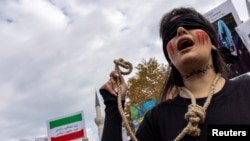A report by the United Nations secretary-general condemns the high number of executions carried out in Iran last year and the government’s violent crackdown against women and girls for defying the country’s mandatory hijab law.
U.N. Deputy High Commissioner for Human Rights Nada Al-Nashif, who on Thursday presented the report at the U.N. Human Rights Council, said, “At least 834 individuals were executed in 2023, which represents a 43% increase from the previous year.”
“Especially troubling is the 84% increase in executions for drug-related offenses in 2023, the highest figure in nearly a decade,” she said.
The nongovernmental organization Iran Human Rights puts the number of people reportedly executed for drug-related charges last year at 471. It says that executions are continuing to surge this year, with “at least 243 people, including 10 women [who] have been executed in 2024, so far.”
Al-Nashif told the council that minorities continue to be disproportionately affected by executions, “with 20% of all executions in 2023 affecting the Baluch minority.”
“While noting an overall decline in the sentencing of children to death since 2024, the report deplores the execution of two child offenders in 2023 and urges the government to introduce an immediate moratorium on the death penalty,” she said, adding that two men also were executed last year “in relation to the September 2022 nationwide protests,” bringing the total to nine.
“Serious allegations of torture-tainted confessions and due process violations have permeated these cases,” she observed.
Mahsa Amini
The September 2022 death of 22-year-old Mahsa Amini while in morality police custody for allegedly incorrectly wearing a hijab sparked nationwide protests.
While mass protests forcing women to wear a hijab have ended, the secretary-general’s report notes that the government’s determination to enforce and even strengthen its hijab law has not.
The report expresses continued concern in relation to a chastity and hijab bill, “which seeks to reinforce mandatory public hijab requirements for women and girls and introduces severe penalties for noncompliance.”
The report describes Iran as an extremely repressive regime, which rules its people through intimidation and coercion. It says civic and democratic space online and offline are severely restricted; access to information is tightly controlled by the government, “including by blocking access to social media platforms,” and journalists, writers and artists are “targeted for exercising their freedom of opinion and expression.”
The report finds Iran’s economic crisis has been exacerbated by unilateral coercive measures and government economic mismanagement, which have adversely affected “living conditions and access to health, food and water.”
Al-Nashif welcomed the government’s directive instructing judges “to align their decisions with the international human rights obligations” of Iran. She also acknowledged some positive aspects of the summary findings of the special committee charged with investigating violations related to the 2022 protests.
“While efforts toward accountability are welcome, concerns remain over the independence of the special committee and the lack of information on steps taken to prevent future violations and address long-standing human rights grievances,” she said.
Fact-finding mission
The deputy high commissioner called on the government to “fully cooperate” with the fact-finding mission on Iran and the special rapporteur on the human rights situation in Iran, both of which are mandated to investigate alleged human rights violations in Iran.
Ali Bahreini, the Iranian ambassador to the U.N. mission in Geneva, poured cold water on that suggestion. He said Iran was opposed to selecting mandates of the Human Rights Council that contain “falsified and inauthentic reports and mechanisms” based on malign political intentions.
“Such prejudicial approaches have nothing to do with the promotion and protection of human rights and is detrimental to the credibility of the human rights values and its structures,” he said, adding that “genuine promotion of human rights can be obtained and secured by cooperation, not confrontation.”
He rejected the secretary-general’s criticism of Iran’s use of the death penalty and his call for a moratorium, noting that “the abolition of the death penalty is not supported by any consensus.”
“Iran implements this punishment only for very serious crimes such as murder, major drug trafficking and terrorist crimes, which endanger the security of the community as a whole.”
He concluded by saying that in next week’s presidential election, “the voice of the people will prove once again” that Iran rigorously promotes democracy.











